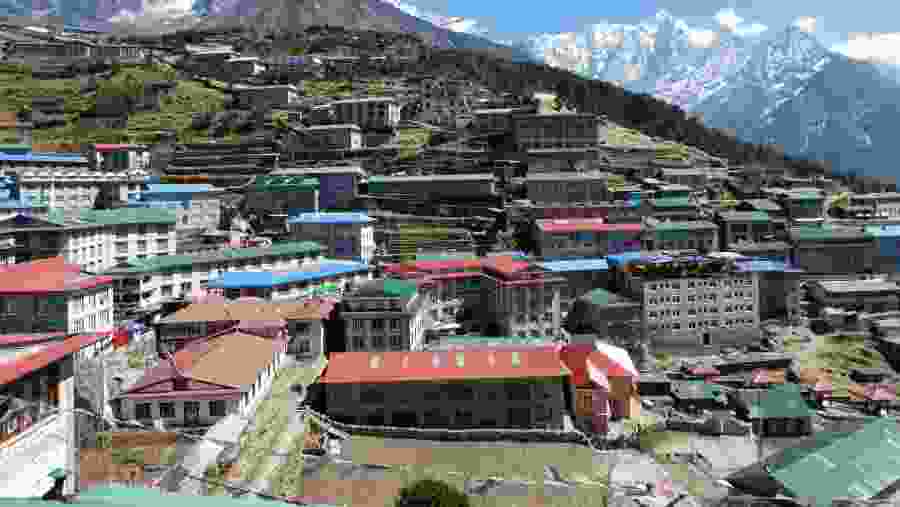15 Day Trek to the Everest Base Camp and Kalapatthar
Highlights
Namche Bazaar, Lukla, Mount Everest
nature, trekking, camping
Group Tour
15 Days
Strenuous
English, French, German, Nepali, Spanish
Languages
English, French, German, Nepali, Spanish
Description
Take on the challenging Everest Base Camp trek over a 13 day trek starting from Lukla. Pass through welcoming villages, alpine meadows, glaciers and steep gradients to reach EBC and Kala Patthar where one can enjoy panoramic views of the Everest. The trip starts and ends at Kathmandu, with a city tour to see it UNESCO world heritage sites.
Itinerary
-
Day 1: Arrival at Kathmandu
Arrival at the Tribhuvan International Airport (TIA), Kathmandu.
Orientation program in the evening.
Overnight at hotel.
-
Day 2: Kathmandu Sightseeing
Full day sightseeing in the Kathmandu Valley.
Explore the Swayambhunath (Monkey Temple), Bauddhanath (Buddha stupa), Pashupatinath Temple and the Patan Durbar Squire.
Overnight at hotel
-
Kathmandu – Lukla Flight (40-45 min) & Lukla – Phakding Trek (866ft., 2640m.): 3 - 4 hours
Meet the Sherpa guides and porters before heading off towards Phakding. The journey passes through Dudh Koshi (“Milk River”).
-
Day 4: Trek to Namche Bazaar (3440m) (6 hrs.)
Trek to Namche Bazaar, which is the main administrative and trading center for the Khumbu region. With magnificent forests of blue pine, fir, juniper, and rhododendron as well as the first view of Everest, it builds up anticipation for a thrilling journey.
-
Day 5: Acclimatisation; Hike to Khumjung (5 hrs.)
The acclimatisation is best done with a hike to the valley of Bhote Koshi River (“River from Tibet”).
Overnight at guesthouse.
-
Day 6: Trek to Tengboche (3860m) (5 hrs.)
The trek from Namche to Tengboche is unbelievably stunning. Far below is the Dudh Koshi and Thamserku.
-
Day 7: Trek to Dingboche (4410m) (5 hrs.)
Trek to Dingboche and enjoy the scenic views of Ama Dablam. It is the only place in the region where barley is produced. Tame pheasants are regularly seen in this area.
-
Day 8: Acclimatisation
Enjoy some time away from the trek to adjust to the higher altitude. Enjoy the scenery and prepare for the next day.
-
Day 9: Trek to Lobuche (4910m) (5 hrs.)
The ascent towards the Everest Base Camp continues through Alpine meadows and summer yak pastures towards the end of the moraine of the Khumbu Glacier. From here, it is a steep, tough climb towards the village of Gorak Shep.
Continue the trek towards Lobuche, where the view is straight towards Nuptse and the sunset is truly magnificent.
-
Day 10: Trek to the Everest Base Camp (5365 meters)
The higher altitude makes this day's trekking quite challenging. The Changri Glacier looms ahead as the trek heads for Gorakshep. Relax and get adjusted to the altitude before the attempt to reach Everest Base Camp.
Return to Gorak Shep. (8 hours.)
Overnight at Guesthouse.
-
Day 11: Hike up to Kalapatthar (5550 meters)
Try to see a different view of Everest today, with a trek up to Kala Pattar. Known to have the best views of Everest, this is a challenging trek, but worth it on a clear day.
Begin the descent from Kalapatthar, heading for Pheriche. This is not the most challenging of hikes, but the altitude can make the many uphill sections below Gorakshep seem tough. Stop to look around; the views are quite spectacular.
-
Day 12:Trek to Namche Bazaar (3441 meters) (6 hours.)
Trek back to Namche Bazaar which takes us around 6 hours. Enjoy the surroundings and meet local people.
-
Day 13: Trek to Lukla, (7 hrs.)
The final day of the trek returns back to Lukla. Relax after the rigorous adventure and reflect on the challenges just undertaken.
-
Day 14: Fly back to Kathmandu (1340m) 30 - minutes. Overnight at hotel. B.B (Breakfast , )
Take the short flight back to Kathmandu, where the rest of the day is free for shopping, sightseeing, or relaxing in one of the many rooftop cafes.
-
Day 15: Farewell
- Transfer to the airport for your homeward journey.
What's Included
What's Excluded
Know Before You Go
Meeting Point
Cancellation Policy
-
For cancellations upto 2 days before the tour -
Refund of 80% of the tour price.



